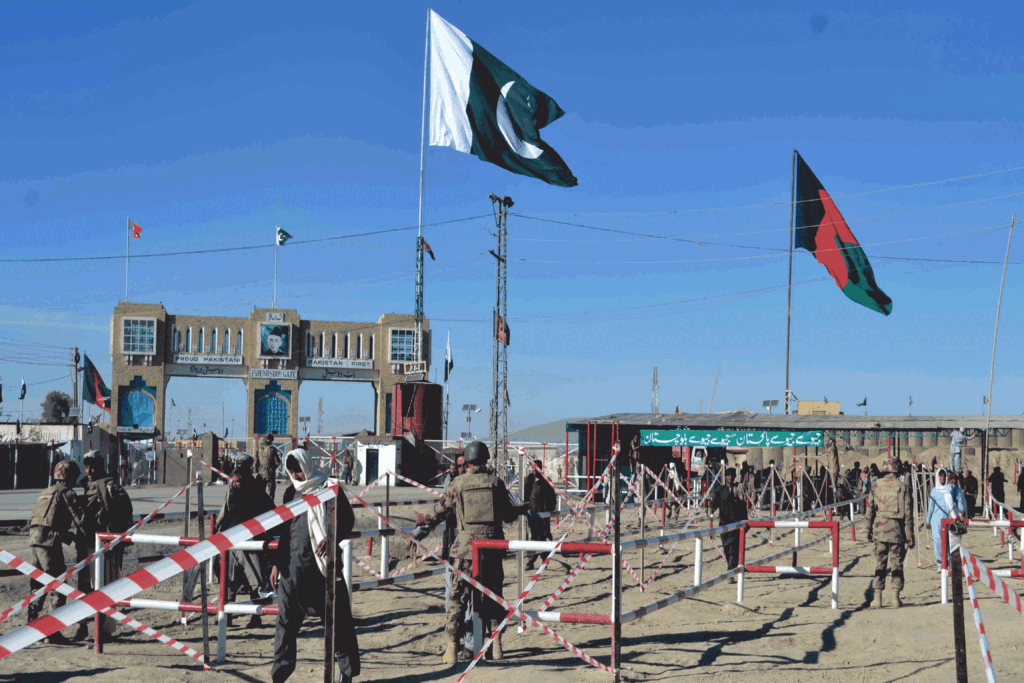Islamabad is dangling a carrot in front of the Talibs while also sending out a strong, unmistakable message that it’s willing to act on terrorism emanating from the Afghan soil.
Saurabh Kumar Shahi
On a balmy morning a few weeks ago, two unidentified gunmen stay waiting at the corner of a well-guarded compound in the interiors of the Kunar province in Afghanistan. The compound looks ordinary from the outside but inside stays one of the most dreaded commanders of Tehreek-e-Taliban Pakistan (TTP). A few minutes later, the commander, confident of his security, comes out for a walk. As he approaches the corner, the assailants empty their AK-47s on him and walk away. Noor Saeed Mehsud’s days on earth are over.
Just a couple of weeks before his killing, Pakistani intelligence had provided his name and unprecise location to the members of the Islamic Emirate of Afghanistan (IEA) but the IEA had categorically denied his presence on the Afghan soil. Mehsud’s killing in Kunar was a message from Pakistan that the IEA cannot wriggle out of the prevailing security situation by feigning ignorance.
In fact, this issue was at the forefront of the discussion that the IEA had with a high-level Pakistani delegation that visited Kabul recently. ISI Chief Nadeem Anjum was also part of the delegation. Sources say that the Pakistanis have given the IEA names and locations of as many as seven TTP commanders currently operating from Afghanistan and have categorically asked them to either eliminate them or expel them.
However, because every such proposal works on a quid pro quo, Islamabad has dangled a carrot in front of the Talibs.
Some experts in India were of the belief that since Pakistan is itself passing through a financial crisis, it has nothing substantial to offer to the IEA. That is a flawed reading of the situation. The offers are more of what Pakistan can deny to IEA rather than what it can give. Take, for example, barter trade. Like Pakistan, Afghanistan is also Forex-strapped at this time. By offering the barter trade to Afghanistan, Islamabad is offering it a lifeline. And, by doing so, it is solving some of its own Forex issues as well.
Then there’s the issue of Chinese investment in Afghanistan. Projects like Trans-Afghan Railways, TAPI Pipeline and Wakhan Corridor-Chitral Highway are all dependent on Pakistan’s cooperation. So while Pakistan cannot make investments in Afghanistan, it can very well scuttle them. For starters, the coordination between the intelligence agencies of Central Asian Republics (at least Tajikistan and Uzbekistan), Russia, China and Pakistan over the security situation in Afghanistan has increased. These agencies trust the Pakistanis to provide them with workable intelligence. Sources say that the delegation made it clear to the IEA that if it fails to rein in TTP, Islamabad will start emphasising on the latter’s relationship with Islamic State Khorasan Province (ISKP) and East Turkestan Islamic Movement (ETIM). The Central Asians and the Russians are wary of how the West might use ISKP to open another front against Russia.
Chinese are even more jittery. They have crushed the insurgency after years of efforts. If they realise that ETIM is going to somehow dominate the Wakhan Corridor and use it as a springboard to attack China-proper, not only will they withdraw investment proposals but they will also likely shut the border for good. For IEA, which is desperate for international recognition, that will be fatal.
The same holds true for the offer of increasing border crossings between the two countries to eight per day from the current five.
For the last few months, Pakistanis have been noticing the chasm developing between the power centres of Kabul and Kandahar. What’s interesting is that it has no sub-ethnic basis. This is a dichotomy between two sub-ideologies developing inside the IEA. The Kabul faction, led by the Haqqanis and helmed by the relatively young leadership, is fed up with arbitrary nature of the missives coming from the Kandahar faction. Since those in Kandahar are ideologues and don’t have to run the day-to-day affairs of the State, they are ideologically moribund. Decrees regarding the suspension of female education etc. rile those in Kabul who are working hard to gain international recognition.
The Kabul faction fought the war on the battlefields and they know how flexibility in ideology and tactics can bear fruit. The Kandahar faction, in contrast, is full of ideologues and bureaucrats who negotiated the West’s surrender in Doha. The Kandaharis believe they secured the surrender which, of course, is a highly convoluted reading of the events. This hubris has made them act in a manner that is destabilising the IEA and the Kabul faction is not happy.
For example, several of the Tajik and Shia-Hazara commanders of the IEA, which the Haqqanis had carefully cultivated and nurtured during the insurgency period, are drifting away and have either relocated to Iran or are planning to establish their own fiefdoms in the North. This is not an ideal situation for the Kabul faction. These Hazara and Tajik Commanders are primarily aggrieved because of two reasons, both of which have to do with the Kandahari faction. First, there’s the issue of autonomy. These commanders were promised a level of financial autonomy that was never given to them when the IEA came to power. Haqqanis tried to put in a word on their behalf but it was brushed away. Second, these commanders perceive that the Kandahris have not been sufficiently respectful to them. Some loose cannon makes a statement against Shias or Tajiks every now and then and the Kandaharis fail to censure them.
The issue of financial autonomy is where the Kandaharis have shown remarkable duplicity. While they use the issue to their favour by holding finances to Kabul, they turn the argument on its head when it comes to Tajik and Hazara commanders in the North. Pakistanis were fed-up with this duplicity as repeated violations by the Kandahari commanders led to blood-spill on the southern borders. Haqqanis, even though fuming in Kabul, were unable to reign in the Kandahari commanders and were left sulking.
However, it appears that Islamabad is now trying to use this chasm to its benefit. By waving the proposal of increasing the number of crossings from five to eight, they are essentially telling Kabul that these new crossings will be in their territories and hence they can benefit from the trade here. To Kandaharis they are telling that they can no longer take the trade situation hostage to their whims.
It will be in the interest of the Kandaharis now to do something about TTP. The internal discord in Pakistan has helped them get away with the issue till now. However, with political and military dispensations on the same page on this issue, the resolve looks more serious now.
Saurabh Kumar Shahi has covered The Greater Middle East for over 15 years and has reported from Kabul, Peshawar, Baghdad, Aleppo, Damascus, Beirut, and Jerusalem among other places.


